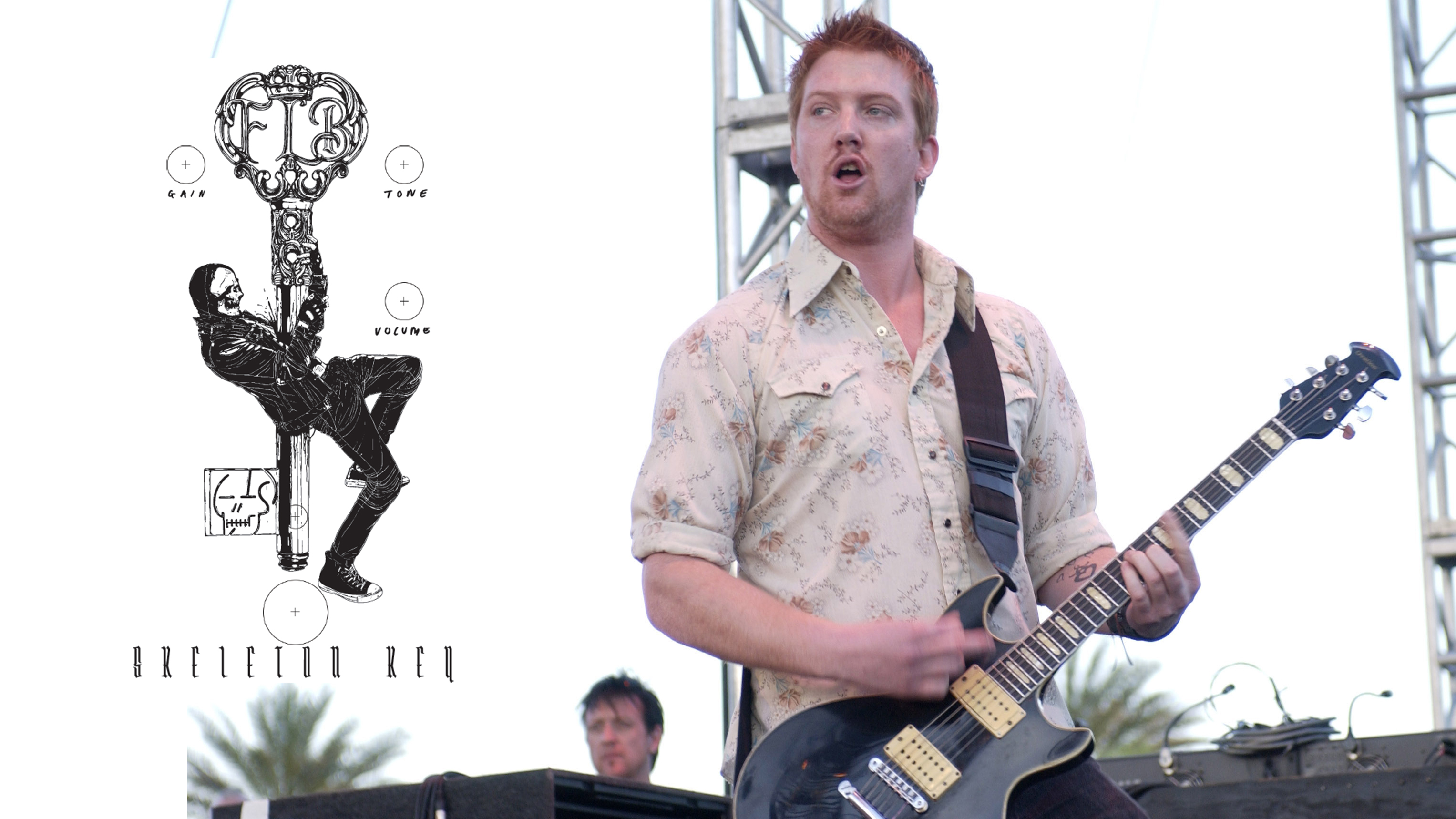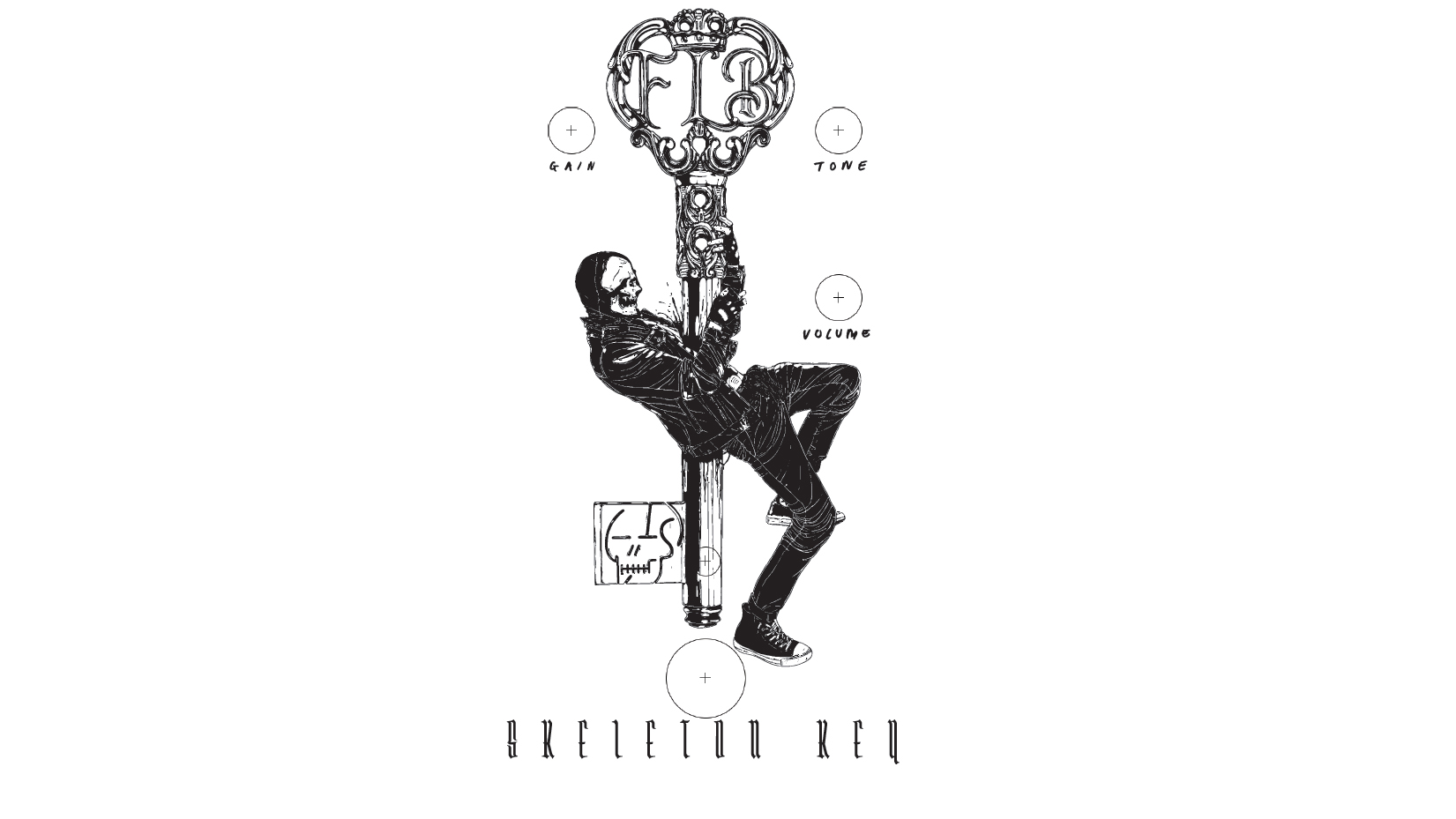
We are big fans of Funny Little Boxes' debut release, the 1991 overdrive pedal. Inspired by the tones of Pearl Jam's Ten album, the £99 pink wonder clearly struck a chord with plenty of other players after its 2021 release and FLB's Andy Ilgunas had to work overtime alongside his collaborators to meet the demand. But even in our glowing 1991 pedal review we couldn't help wondering what would come next. Well now we know, and we're very excited!
It's called Skeleton Key and it aims to deliver some of the holy grail drive tones of Josh Homme in Queens Of The Stone Age. These guys clearly like a challenge!
Andy describes Skeleton Key is "an op amp-based distortion pedal with a unique voice and specifically tuned gain stages so that when you put it between your amp and down tuned, humbucker loaded guitar you can nail a range of the incredible tones on offer throughout the QOTSA back catalogue."

Last year saw Andy undergoing treatment for cancer, and he's now physically recovered, but when he restarted work on the original planned follow-up to 1991 – a pedal that's still in the works – but things took a different turn.
"Trying to jump back in where we left off after a three-month break is migraine-inducing and though I sit with breadboard and oscilloscope in front of me, for hour after hour, I make little progress," explains Andy in his introduction to Skeleton Key.
"All the while, there is a nagging in the back in my mind, a sensation of something persistently tugging me away from what I am trying to work on and toward something else," he continues. "Eventually it takes over.
"Instead of working on nailing the circuit I have at this point invested hundreds of hours and thousands of pounds in I find myself starting afresh with a couple of op amps and no set direction or even clear idea of what I am doing; working on pure instinct in an attempt to satisfy the hammering in my head.
Want all the hottest music and gear news, reviews, deals, features and more, direct to your inbox? Sign up here.
"After a week I have something. In terms of the circuit topology, it is completely unremarkable, but the sound it produces is exceptional. Visceral and thrilling."
There’s a reason Josh Homme’s tones are so hard to nail
The timing ended up being fortuitous after a difficult few months. Around the same time QOTSA announced the reissue of their self-titled debut album and Andy put it on for a listen.
"And there it is, in the first track Regular John," he recalls. "That same hammering, relentless onslaught that I have had bludgeoning my brain for the past few weeks."
Refocussed on this new pedal design, Andy made rapid progress with Matt Webster offering feedback through testing. But as Homme fans know, a QOTSA pedal is not an easily-deliverable task. Andy knows this too.
"Although a lot of QOTSA songs contain what are ostensibly very similar sounds, there are several sonic nuances that feature, and which are not easily captured," he acknowledges. "There’s a reason Josh Homme’s tones are so hard to nail."
One element is Homme's Peavey Decade amp.
"Let us be clear, this is not a clone of that amp," Andy states. "Whereas it is verified that the Decade has been used throughout the making of several QOTSA records, the fact is it is only a single part of the sound as a whole and I remain unconvinced that the Decade alone can truly capture the QOTSA sound."
"The tricky thing with capturing QOTSA’s sound is that it is often not what you think it is and due to the general veil of secrecy that has surrounded the band and how they record there is no magic key for unlocking their sound," he continues.
Andy and Matt have spent long hours "forensically listening" to QOSTA songs and comparing to the circuit of the Skeleton Key as it developed. Constantly refining it.
"The most important part of any circuit is the gain staging," he explains. "This posed one of the biggest challenges in the circuit’s development.
"You might be surprised but, for such a powerful sound, the QOTSA guitar tone isn’t that high gain. I have lost count of the number of times I sat on the floor of Matt’s studio while he would play the current iteration of the circuit and take off his headphones only to say, 'There’s still too much gain'.
The adjustments continued.
"This would then present a new set of problems in how the adjusted gain would affect the EQ," admits Andy. "The tone and gain controls in this pedal are highly interactive with each other so the development of it has mainly revolved around a delicate balancing act of the two."
But he says the final result has been "worth every second". "A particular point of pride has been capturing the guitar tone on First it Giveth," he reveals. "Which is a pretty individual tone within the QOTSA canon.
"The high levels of interactivity between the gain and tone controls have been the key to being able to dial in just the right amount of gain and treble to nail it."
The result is a pedal Andy and Matt have every confidence in. "As I said earlier there was no such key to easily unlock the QOTSA guitar sound," says Andy. "But there is now that we have made one."
The artwork for Skelton Key is even provided by Boneface, who has worked on QITSA albums from Villains onwards.
Andy has even offered some pointers on dialling in the tones for specific Queens songs.
"Start with everything at noon and you are in No One Knows and Little Sister territory. From there you only need a few tweaks of the gain and tone control to access everything from Lost Art of Keeping a Secret to First It Giveth and beyond.
Preorders are now open for a limited run of 100 Skeleton Key pedals at £99 each ahead of its general release, and even though there isn't a firm date for dispatch, FLB are working to a timeframe of approximately five weeks.
More info at Funny Little Boxes.

Rob is the Reviews Editor for GuitarWorld.com and MusicRadar guitars, so spends most of his waking hours (and beyond) thinking about and trying the latest gear while making sure our reviews team is giving you thorough and honest tests of it. He's worked for guitar mags and sites as a writer and editor for nearly 20 years but still winces at the thought of restringing anything with a Floyd Rose.